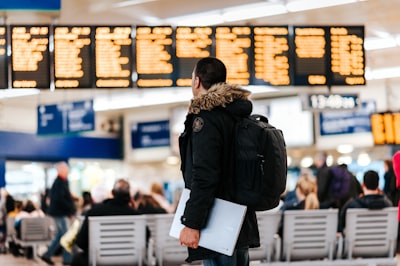Common reasons for UK visa rejections: How to submit a successful visa application
When it comes to applying for a UK visa, success largely depends on careful planning, attention to detail, and avoiding common mistakes that many applicants make.
In this comprehensive guide, we'll walk you through the steps to increase your chances of visa approval. We'll also highlight the most common pitfalls that applicants often stumble upon during the process.

Photo by Nataliya Vaitkevich on Pexels
Understanding the common reasons for visa rejections
Now that we've covered the key steps to increase your chances of a successful UK visa application, let's delve into common reasons for visa rejections:
- Incomplete or Inaccurate Documentation: Missing or incorrectly filled-out documents can lead to rejection. Ensure all documents are complete, up-to-date, and accurately represent your situation.
- Insufficient Financial Proof: Failure to provide evidence of your financial capability can result in a visa denial. Pay close attention to the required financial documentation for your visa type.
- Criminal Record: A criminal record or pending charges can lead to visa rejection. Be aware of the UK's strict policies regarding criminal convictions and take necessary steps to address any issues.
- Deceptive Intentions: If the immigration authorities suspect that you have deceptive intentions, such as planning to work on a tourist visa, your application may be denied.
- Inadequate Language Proficiency: Failing to meet the language requirements for your visa type can lead to rejection. Ensure you take the necessary language tests and achieve the required scores.
- Lack of Genuine Relationship: For family visas, the UK authorities assess the genuineness of your relationship. Provide substantial evidence to prove the authenticity of your familial ties.
- Tuberculosis Test Non-Compliance: If your home country is on the list of countries requiring a tuberculosis test, ensure you undergo the test and submit the necessary documentation.
- Previous Visa Overstays: If you have a history of overstaying previous visas, your new application may be denied. Always adhere to visa conditions.
- Healthcare and Insurance: Not having proper healthcare coverage or insurance, as required by your visa type, can result in rejection. Familiarize yourself with the healthcare provisions of your visa.
Steps to increase your chances of visa approval
Understand the visa types and eligibility
The first and most crucial step is to understand the various types of UK visas available and their specific eligibility requirements. Whether it's a tourist visa, work visa, or student visa, each has its own set of prerequisites. Visit the official UK government website to explore the different visa types and their eligibility criteria.
UK Government's Visa Types: Link
Submit accurate documentation
One of the major mistakes people make is submitting incomplete or inaccurate documents. Double-check the official document checklist provided by the UK government and ensure that you have every required document in order. It's vital to keep all your documents organized to prevent any confusion during the application process.
Understand the financial requirements for your visa type
Many visa applications are rejected due to insufficient financial evidence. You need to prove that you can support yourself during your stay in the UK. Understand the financial requirements for your specific visa type and provide bank statements, payslips, or sponsorship letters as necessary.
UK Government's Financial Requirement: Link
Be honest and provide accurate information
Filling out the visa application form is a meticulous task. Be honest and provide accurate information. Any false information can lead to visa rejection or even a ban from entering the UK. Remember, you can always seek professional help in completing your application form if you're unsure.
UK Government's Visa Application: Link
Meet the English Language requirement
For certain visa categories, like the Tier 2 work visa, you may need to prove your English language proficiency. Make sure to take the necessary language tests and achieve the required scores. Check the UK government's official guidelines for English language requirements.
If your visa category requires proof of English language proficiency, choose an accredited language test center. Ensure that your test results are within the validity period and meet the specific requirements of your visa category.
UK Government's English Language Requirement: Link
List of English language tests that have been approved by the Home Office for English language requirements for limited leave to enter or remain under the Immigration Rules: Link.
Check if you need a tuberculosis test
Some applicants, depending on their home country, need to undergo a tuberculosis (TB) test before applying for a UK visa. Check the UK government's guidelines on TB testing to determine if it applies to you.
UK Government's TB Testing Guidance: Link
Choose the right visa service for biometric data collection
Selecting the right visa service is crucial for a smooth application process. UK visa applicants are required to provide biometric data, including fingerprints and a photograph.
It's essential to book an appointment at an approved visa application center to complete this process. The UK government provides a list of authorized visa application centers. Be cautious of using unauthorized agents or services, as this can lead to complications.
Find a visa application centre: Link
Understand healthcare and insurance
The UK has a comprehensive National Health Service (NHS). Depending on your visa type, you may be eligible for free healthcare or need to arrange private health insurance. Make sure to understand your healthcare options and comply with them.
HC2 Certificate: Get help with NHS health costs if you have a Low Income
How to get Free NHS Prescriptions and Dental Treatment in the UK
Avoid overstaying
Overstaying your visa is a serious offense and can lead to deportation and bans from re-entering the UK. Familiarize yourself with the visa extension process if needed, and apply before your current visa expires.
Frequent reapplications
If your visa application is rejected, you can reapply, but it's essential to address the reasons for rejection and provide additional documentation or explanations. Frequent reapplications without substantial changes can negatively affect your chances of approval.
Seek professional advice
If you find the visa application process overwhelming or have complex circumstances, consider seeking advice from an authorized immigration advisor or lawyer. They can provide expert guidance tailored to your situation.
Conclusion:
A successful UK visa application is achievable with careful planning, attention to detail, and a comprehensive understanding of the application process. By avoiding common mistakes and adhering to the guidelines and eligibility requirements, you can significantly increase your chances of visa approval.
Remember to stay updated with the latest information on the official UK government website and seek professional guidance if needed.
Maze provides an end-to-end platform that disrupts the traditional relocation model.
We connect people relocating with service providers, reduce cost and enable the personalization of customer journeys to the UK.
Follow us on Instagram, Twitter, Facebook and LinkedIn, or Contact us with your relocation enquiries.

